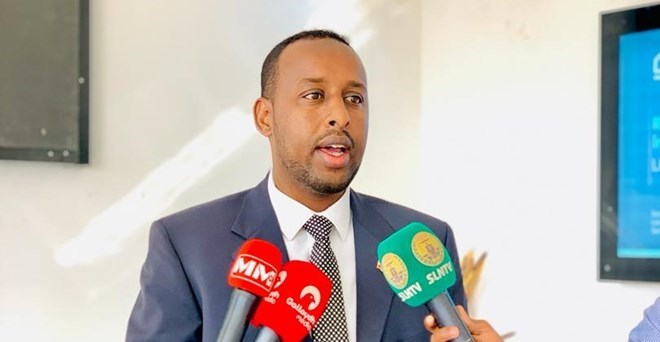
Tuesday February 20, 2024

FILE PHOTO - The General Manager of Somaliland's Civil Aviation Authority, Omar Sayid Abdilahi Aden
Mogadishu (HOL) - The Somaliland government has declared success in managing its airspace, claiming effective service provision to a multitude of aircraft. However, amidst this assertion, tensions have surged as the Somaliland Aviation and Airports Authority refutes allegations of airspace disruption by the Somali government.
Somaliland also alleged Somalia's civil aviation authority's involvement in the killing of one of its employees named Abdinasir Muse Dahable.
Reports emerging over the weekend reveal a troubling scenario within the Mogadishu FIR, with nearly a dozen aircraft reportedly contacted by unauthorized controllers, issuing conflicting instructions. Instances of unauthorized climb and descent clearances, particularly prevalent in the northern part of Somali airspace, spotlight the ongoing political discord between Somaliland and Somalia. Despite Somaliland's lack of international recognition, both entities vie for control over the airspace.
A specific incident involving an Israeli airline, El Al, on a route from Thailand to Ben Gurion Airport in Tel Aviv, has raised concerns about security vulnerabilities during flights traversing the Mogadishu FIR.
The Somali Civil Aviation Authority (SCAA) has reiterated its authority over the airspace, emphasizing its designation as the "Mogadishu Flight Information Region (FIR)" since the 1960s.
Further complicating matters is the troubling revelation of frequency jamming, highlighted in a complaint lodged by the Federal Government of Somalia. Deliberate interference with critical air traffic frequencies poses a significant threat to aviation safety, violating international aviation laws and norms.
The dispute over airspace control has escalated further, with Somalia actively denying access to flights bound for Hargeisa, Somaliland's capital. This includes incidents such as the denial of entry to an Ethiopian Airlines flight carrying senior officials, highlighting the diplomatic tensions surrounding the airspace issue.
Amidst accusations from Somaliland of mismanagement and misuse of funds by the Mogadishu government, the airspace dispute has far-reaching consequences. Allegations range from diverting funds earmarked for airport development to failing to equip Hargeisa with necessary air traffic management equipment.
The Somaliland Civil Aviation and Airports Authority (SL-CAAA) has vowed to protect its airspace, signalling a potential escalation in the conflict. With both sides claiming authority and tensions mounting, the airspace dispute threatens to disrupt regional air traffic and undermine safety measures.
As the situation unfolds, stakeholders in the aviation industry must closely monitor developments and assess the implications for flight operations within the region.
Somali airspace regained its Class A classification after over 30 years in January 2023. The change to Class A airspace can potentially increase traffic to as many as 600 flights daily.